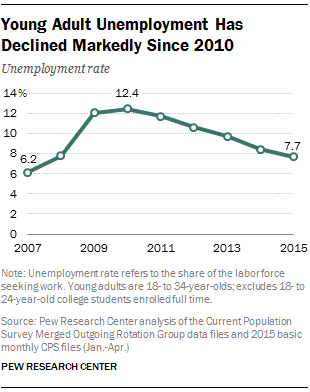
By CAROLINE BEATRICE
Millennials have surpassed Boomers as the largest group in the workforce and they are desirable hires, according to a Pew Research Study.
Millennials, between 18 and 24, tend to have more energy, are willing to start lower and work their way up and are more technologically savvy. Companies also like to hire a young professional and train them accordingly where they can then work their way up.
For example, financial giant JP Morgan tends to hire young adults for their internships and if all is well, offer them jobs afterwards.
Junior Nicole Sulli has landed a 10-week internship with JP Morgan this summer where she will be working as an audit analyst intern and analyzing the internal risks and controls. The interview process was tough, she said.
“I originally applied online through the JP Morgan website. From there I did an online interview, then a phone interview, and finally a 6 hour super day in New York City,” Sulli said.
She hopes to have a job offer after the program, but at 21 and full of energy, she is prime candidate in what companies are looking to hire.
Students and young adults follow their bliss into careers following their majors. With many internships being available through colleges, it makes it easier to find jobs which can turn into future careers. Many colleges also require internships, which pushes students to figure out what career path they want to be headed towards.
More Teens are Getting Employed
A new report from the Brookings Institution looks at the labor market struggles of teens(ages 16 – 19) and young adults (ages 20 to 24). In 2000, 55 percent of teens had paid employment sometime during the year, the report says. By 2011, it was only 28 percent—the highest unemployment rate for teens in the post-World War II era.
 According to a Pew Research Study, the weekly earnings of college-educated young adults have nearly recovered. In 2015, the earnings of these workers ($951/week) were almost back to the 2007 level ($966/week). Less-educated workers have seen a more modest recovery in their earnings. For example, for young adults with no education beyond high school, earnings were $500 per week in the first third of 2015, still 5% below their 2007 level ($527/week).
According to a Pew Research Study, the weekly earnings of college-educated young adults have nearly recovered. In 2015, the earnings of these workers ($951/week) were almost back to the 2007 level ($966/week). Less-educated workers have seen a more modest recovery in their earnings. For example, for young adults with no education beyond high school, earnings were $500 per week in the first third of 2015, still 5% below their 2007 level ($527/week).
For small- business owners, it may be beneficial to hire younger workers because they can offer lower pay, and fewer benefits, fresh perspective, tax credits, and ability to make an impression which can further pave their future opportunities, according to a Brookings Institute Study.

Dina Ingenito, 20, of Lyndhurst currently has an unpaid internship with Success Communication Firm in Parsippany where she manages social media and public relations.
“This job will help me make future connections which I can use to build a career,” she said.
Ingenito is starting a blog where she will be comparing millennials versus baby boomers and will have new feedback each week. Ingenito will receive a stipend at the end of her internship program.
Leave a Reply
You must be logged in to post a comment.